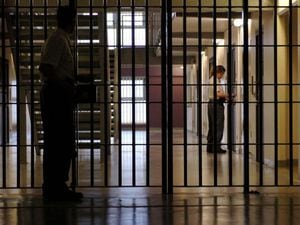Police visited Cheryl Hooper the day before her murder
Police visited Cheryl Hooper over her concerns about her estranged husband the day before he murdered her - but a watchdog has concluded the force "could not have reasonably foreseen the horrific event that transpired".

The Independent Office for Police Conduct carried out a review of police contact with Mrs Hooper prior to the conclusion of the trial of her killer – estranged husband Andrew Hooper.
Following Hooper's conviction,details of the investigation have now been published.
The investigation was required because Cheryl had contacted Staffordshire Police about Hooper's behaviour only two weeks before she was killed – telling officers his behaviour had been intimidating.
Police checks also revealed he legally owned guns.
See also:
The investigation has shown that the Staffordshire Police call handler brought the log to the attention of the multi-agency safeguarding hub, child protection, and the firearms licensing unit.
Because Cheryl lived in Shropshire, Staffordshire Police sent her concerns to West Mercia Police, so they could complete a risk assessment, put the appropriate safeguarding measures in place and obtain a statement from her.
A statement from the IOPC confirms officers had contact with Cheryl on several occasions during the month she was killed, but that her concerns did not amount to any criminal offences from Hooper.
It said: "Between January 12 and 25, 2018, West Mercia Police logged various reasons for delays in meeting with Ms Gabriel-Hooper and had been advised by her on January 16 that there had been no further problems with Mr Hooper. A West Mercia Police officer saw Ms Gabriel-Hooper on January 25, 2018, at her home in Newport, Shropshire and obtained further details from her. Ms Gabriel-Hooper’s concerns did not amount to any criminal offences against Andrew Hooper.
On January 26, 2018, Cheryl was fatally shot with an unlicensed firearm by Andrew Hooper outside her home.
Full coverage of the trial:
IOPC Regional Director Derrick Campbell said: “I send my condolences again to Ms Gabriel-Hooper’s family and everyone else affected by her traumatic death.
"After contact from Ms Gabriel-Hooper both police forces took some precautionary steps to help safeguard her and ensure her estranged husband’s access to licensed firearms was removed. Following the police visit the day before she was shot, there wasn’t evidence of higher risk to Ms Gabriel-Hooper to warrant more robust action. Police could not have reasonably foreseen the horrific event that transpired.
“While some enquiries could have been carried out more quickly or thoroughly, we found no indication that any officers or staff acted in a manner that would justify any disciplinary proceedings. Police decision-making and actions were carried out in compliance with relevant force and national policies. As there did not appear to be a process in place by which actions sent to another force are reviewed, we recommended that Staffordshire Police identifies opportunities for improved cross-border liaison.”
The IOPC investigation looked at the initial call made by Cheryl to Staffordshire Police and the force’s actions, Staffordshire Police’s response to the knowledge that Andrew Hooper was a firearms licence holder, and West Mercia Police’s response to the incidents transferred to them from Staffordshire Police.
The statement from the IOPC said that they had found no evidence for any disciplinary action against officers.
It said: "Our investigation found that Staffordshire Police conducted enquiries concerning Andrew Hooper’s firearms, and on 19 January, Andrew Hooper voluntarily surrendered his shotguns to a friend and handed over his licence to Staffordshire Police.
"Evidence also showed that a Staffordshire Police officer had re-examined the incident log before Mrs Hooper was killed. They found no cause to upgrade the level of risk, but recommended the case was reviewed by a specialist unit within the force dealing with vulnerability.
"Based on the evidence available we found no indication that any person serving with either police force may have behaved in a manner that would justify the bringing of disciplinary proceedings or had committed a criminal offence.
"We recommended that Staffordshire Police continues to identify and explore opportunities to improve cross-border liaison and mutual assistance with neighbouring forces.
"After reviewing our report, both Staffordshire Police and West Mercia Police agreed."





